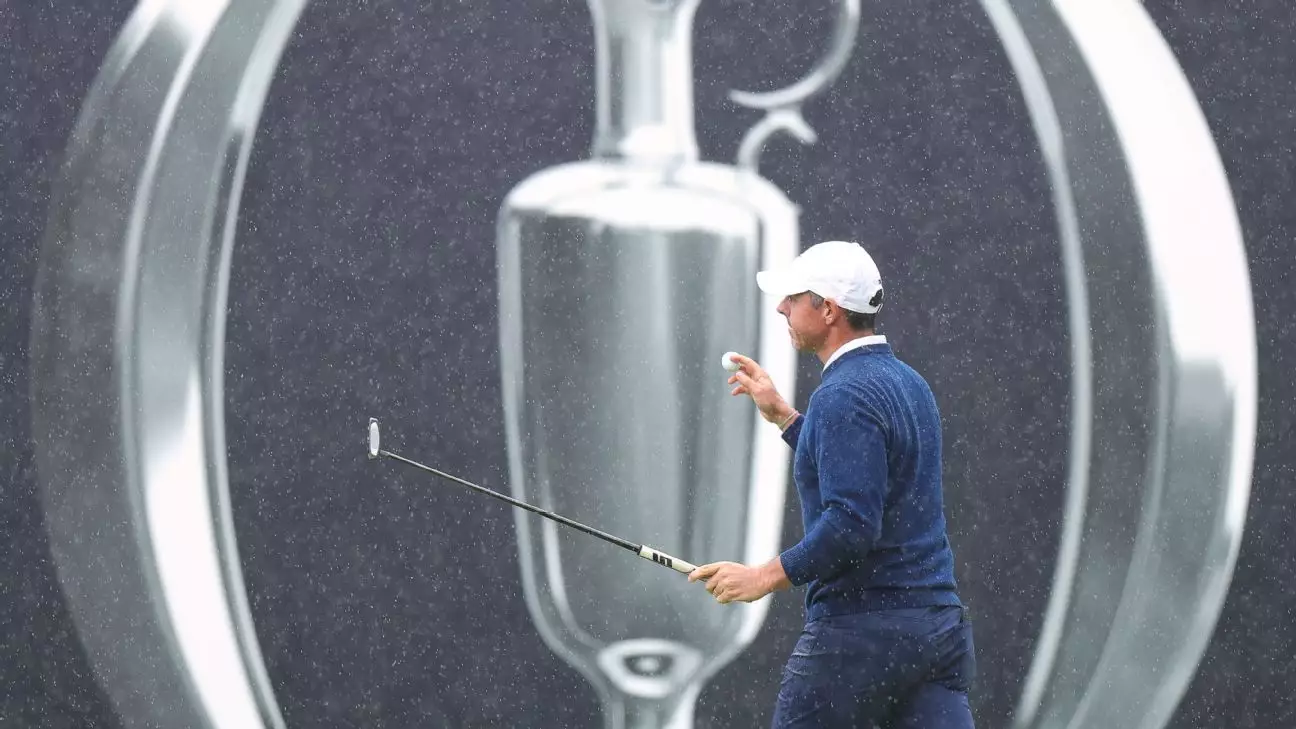Rory McIlroy’s recent performance at Royal Portrush is far more than just a stepping stone in his golf journey; it is a testament to personal resilience and a refusal to be defined by past shortcomings. Six years ago, McIlroy faced a humbling exit at the Open Championship in his homeland, a defeat that left visible scars on his confidence. The 2019 tournament, which was marred by his early elimination, symbolized not just a missed opportunity but also a moment of internal struggles—an inability to meet the high standards expected of a player of his caliber during crucial moments. Fast forward to the present, his ability to properly respond to that disappointment reveals a deeper truth: success is as much about mental fortitude as it is about skill.
The second round of this year’s Open saw McIlroy finally thrive under pressure, sending a clear message that perseverance can ultimately overshadow past failures. His back-to-back under-par rounds dispel the myth that past setbacks inevitably haunt athletes forever. Instead, they highlight the importance of patience, recalibration, and an unwavering commitment to self-improvement. McIlroy’s evolution from a promising talent to a seasoned competitor who can withstand the spotlight underscores a vital lesson: resilience isn’t just a personal virtue but a collective one that inspires audiences and aspiring players alike.
The Role of Fan Support and National Pride in Athletic Performance
One of the most striking elements of McIlroy’s current campaign is the palpable energy emanating from the crowds at Royal Portrush. These fans aren’t merely spectators—they serve as vital catalysts, fueling the emotional and psychological strength of players like McIlroy. Throughout his rounds, the support from the Irish and wider Northern Irish community demonstrates how sports transcend individual achievement, becoming a symbol of national pride and cultural identity.
This collective backing offers more than motivation; it embodies a sense of belonging, a shared history of resilience and hope. For McIlroy, this support isn’t just about winning a tournament but about representing a community with deep roots in golf and a history of overcoming adversity. Such backing doesn’t merely boost individual performance; it elevates the entire sport, emphasizing the importance of local heroism and community spirit. The crowds’ chants and cheers remind us that sports are inherently social and political arenas where collective pride can ignite extraordinary performances.
Strategic Growth and the Challenges of Modern Golf
McIlroy’s strategic approach to the game reflects a nuanced understanding of a sport that has become increasingly complex and demanding. This year’s tournament highlights how raw talent alone is insufficient when taking on elite courses with intricate layouts and psychological hurdles. McIlroy’s increased accuracy off the tee and his improved approach play reveal a player’s growth in adapting to modern golf’s challenges.
Yet, this strategic evolution is also a reflection of the broader transformation in professional golf—an increasingly competitive field where mental resilience, technical precision, and emotional stability are paramount. McIlroy’s conscious effort to control his game and stay focused under pressure demonstrates a healthy evolution of not just his skill set but his mental approach to competition. His acknowledgment of needing to “have everything firing” over the weekend underscores the high stakes and perfectionist tendencies necessary at the highest levels, particularly on courses that demand not just technical prowess but strategic mastery.
The Politics of Legacy and National Identity in Sports
In a deeper sense, McIlroy’s resurgence symbolizes the intricate relationship between personal achievement and national identity. When he reflects on playing in front of Irish crowds, there’s a nuanced political dimension—sports being a vessel for cultural expression and collective aspiration. His journey from a young player dreaming of local tournaments to a Grand Slam champion supported fervently by his compatriots underscores a broader narrative about belonging and the pursuit of excellence within one’s national context.
This dynamic also prompts critical reflection on how sports can promote unity in times of division and serve as a platform for regional pride. McIlroy’s story reminds us that athletes are not merely competitors but symbols of cultural resilience and aspirations. Their performances are intertwined with national hopes, political identity, and collective memory, which adds layers of significance to each shot and victory or defeat. As such, McIlroy’s current path should be seen as a consequence of this complex interplay—where individual grit intersects with collective identity in shaping sports legacies.
—
This analysis highlights the multifaceted nature of Rory McIlroy’s campaign, emphasizing resilience, community support, strategic growth, and the political symbolism embedded in sports. It advocates a view that celebrates the athlete’s personal triumphs while scrutinizing the socio-cultural forces that elevate sports into modern-day narratives of hope, pride, and political expression.



Leave a Reply